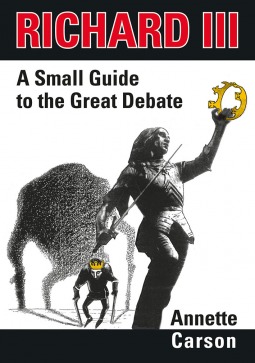Richard III
A Small Guide to the Great Debate
Annette Carson
Troubador Publishing Ltd
Matador
Annette Carson (author of the The Maligned King, a longer if earlier work on Richard III) tries to set the record straight by erasing likely misconceptions. She placed me firmly within her camp when she discussed her reasons for dismissing them. I'm all in favor of understanding people over creating villains, which appears to be the daily pastime of the collective internet.
"Fame feeds on itself. Newspapers and magazines were duly brimming over with articles [about Richard III], most of them reproducing the usual stories by the usual people who made up their minds about Richard years ago.... [S]ober facts would diminish diminish the sensational aura that surrounds Richard III.... [I]t's vital to avoid 'looking back', you have to put yourself firmly in the past as if it is the present."
 Carson then proceeds to dismantle the more sensational aspects around Richard III's story: Richard III did not usurp the throne, was not deformed (though he had scoliosis), was a beneficent and pious ruler, did not kill Edward V, the successor, etc.
Carson then proceeds to dismantle the more sensational aspects around Richard III's story: Richard III did not usurp the throne, was not deformed (though he had scoliosis), was a beneficent and pious ruler, did not kill Edward V, the successor, etc.
The problem becomes that an anti-book (that is, a book primarily filled with all that did not happen) makes it hard to form a picture. Much as I sided with the author's stance and well-wrought reasoning, I was torn by the book's outcome. On the reread, I had a clearer picture and enjoyed the book more.
 I discovered another issue when I watched a BBC(?) program on Richard III: They had a storyline, a history of Richard III and his brother's violence that was a more compelling presentation of the king's personality. Although Carson's version was well reasoned, her version slipped away as I slid into their version of events. This creates a compelling case for finding the story in biography.
I discovered another issue when I watched a BBC(?) program on Richard III: They had a storyline, a history of Richard III and his brother's violence that was a more compelling presentation of the king's personality. Although Carson's version was well reasoned, her version slipped away as I slid into their version of events. This creates a compelling case for finding the story in biography.
Nonetheless, Richard III: A Small Guide to the Great Debate probably works best as a supplementary text--in addition to reading Shakespeare's or Sir Thomas More's creative "biographies" or a more recent, researched biography like Carson's own, The Maligned King, or perhaps one that opts for a traditional view so you can have a greater sense of the controversy.


No comments:
Post a Comment